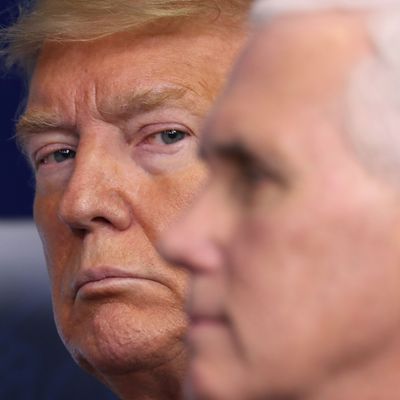
One of the familiar genres of White House reporting during the Trump era has been the theme that President Trump is degenerating into madness, or at least some deeper state of madness. I have treated these reports with persistent skepticism. By all outward signs, Trump’s grip on reality has waxed and waned in regular intervals, and the man who publicly insisted in 2011 that Barack Obama had faked his birth certificate did not seem substantially more hinged than the one who claimed Joe Biden had fired a Ukrainian prosecutor to protect his son’s business. The people around Trump who believed he was growing more deranged were perhaps mistaking their own diminishing ability to cope with his delirium with a change in the patient’s underlying condition.
And yet here, in the true final stages of the Trump presidency, we at last have evidence of genuine change. Trump’s mental decline may not be actually accelerating, but he is turning against his supporters in a sharp and distinctive fashion.
The New York Times first reported this weekend that Trump held a long, contentious meeting on Friday pitting crazy against crazier. He has continued over the following days to turn away from his more clear-eyed supporters and gravitate to the ones who entertain his delusions that he can still overturn the election.
An entire layer of toadies who cynically enabled Trump’s misconduct throughout his presidency, but have since calculated that his options are exhausted, have lost favor in the president’s eyes. Axios and the Washington Post have reported that Trump has denounced, or begun to view warily, such former loyalists as Mitch McConnell, Bill Barr, Mark Meadows, and even Mike Pence. Into their places have stepped figures like Sidney Powell, Michael Flynn, QAnon-enthusiast Marjorie Taylor Greene, and former Overstock chief executive Patrick Byrne.
One indication of the level of terrifying disarray within Trump’s revamped inner circle is that the Post gets halfway through its story before explaining that Byrne arrived at his position in life after an affair with a notorious Russian spy, followed by a descent into paranoia. Byrne was the chief executive of Overstock.com; he had an affair with Russian spy Maria Butina, who was convicted and deported. After that, Byrne was fired, then came to believe Butina was framed by a deep-state conspiracy, then got heavy into Trumpist conspiracy theories, started giving interviews to the likes of Glenn Beck, and lo and behold found himself in the White House as a presidential strategist.
There was once a time, years ago, when “CEO falls for Russian spy, goes mad, gets fired, becomes presidential strategist” would have been a major story in itself, not merely a colorful side plot.
The Hitler analogies are easy to overplay — Trump is not a genocidal warmonger, which is by far Hitler’s most salient trait — but the whiff of the Führerbunker is difficult to miss when you encounter such passages as this, from Axios: “Trump, in his final days, is turning bitterly on virtually every person around him, griping about anyone who refuses to indulge conspiracy theories or hopeless bids to overturn the election.” In lieu of Russian tanks, the unstoppable force everybody else around the mad leader can see coming is Joe Biden’s clear Electoral College victory.
So the likes of Barr and McConnell are all slowly edging away while Trump rages at their betrayal and seeks out followers delusional enough to indulge his fantasies. Trump sent out a bizarre attack on McConnell for refusing to support his hopeless attempt to decertify Biden’s election. Even supine Mike Pence is now “not fighting hard enough for him,” reports Axios.
Barr’s escape — complete with a last-ditch attempt to wash off the Trump stink by publicly decrying his boss’s demands that he appoint prosecutors to investigate Hunter Biden and the election-fraud conspiracy — is especially rich. Barr was animated by the conviction that the norms were being shattered by Trump’s opponents, not by Trump. He once testified before Congress that Trump couldn’t have obstructed the Russia probe because he genuinely believed he was innocent. Since Trump also maintains that, but for a Hugo Chávez–designed computer algorithm, he won the election by a landslide and can actually overturn the results, you wonder how much legal weight Barr currently places on what Trump believes. Is insanity an all-purpose defense against obstruction of justice?
One irony of Trump’s final, degenerative stage is that, while he has dispensed with even the pretense of attending to his formal responsibilities, his obsession with overturning the election result has given him a laserlike focus rarely detected before. The Post reports that his Friday meeting was longer than four hours. In his entire term until now, has Trump ever stayed engaged in a meeting on a single topic for that long?






























